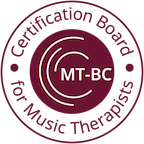Singing is not only a great way to have fun, but it also offers some fantastic benefits for both kids and adults. From improving your mood to reducing stress levels, singing can help you in many ways. And best of all, anyone can do it! I’m serious. Singing does not always have to be about perfect pitch and performance; in music therapy, it often is not about performance and is focused on the non-musical benefits and skills acquired by singing.
For the purpose of this blog, let’s agree to view singing from the perspective of wellness rather than performance.
If you are a parent, singing is an amazing way to maintain your wellness while also engaging with and providing excellent environments for your child. Read on to learn more about how singing can have a lasting impact on your family’s wellness!
Singing can help relieve stress and tension.
Singing is a fantastic way to relieve stress and tension. It can help calm the brain and body, making it an excellent tool for those dealing with overwhelming emotions. Singing releases endorphins and other hormones, making us feel instantly brighter, even if we don’t feel like we can hit any of the right notes! Learning a few basics will make you more confident in using singing to decompress and relieve stress. So take a deep breath next time you’re feeling overwhelmed, turn your favorite song up loud – and sing along!
Singing can improve your breathing and lung capacity.
Believe it or not, singing can positively impact your breathing and lung capacity. For some, singing can be an effective way to ease shortness of breath and reduce stress. For the clients I work with dealing with respiratory issues, I use singing to mark deep breaths, encourage inhaling and exhaling, and develop strength in the lungs. In Neurologic Music Therapy, this technique is called Therapeutic Singing and is defined as:
…the unspecified use of singing activities to facilitate initiation, development, and articulation in speech and language as well as to increase functions of the respiratory apparatus. Therapeutic singing can be used with a variety of neurological or developmental speech and language dysfunctions (Glover et al. 1996, Jackson et al. 1997, Thaut 2005).
One can improve respiratory power and stamina by faithfully engaging in singing exercises. Vocal training can also strengthen and increase the range of your vocal cords by improving the flexibility of the diaphragm, which helps maintain healthy breathing. Plus, exercising your vocal cords increases lung capacity allowing you to sustain certain pitches more quickly. So don’t be scared to show off your voice – strong lungs are just a song away!
Singing can boost your immune system.
Singing is an incredible way to benefit your health! Not only does it lift the spirits and promote relaxation, but research has also shown that singing can strengthen your immune system. Singing boosts immunoglobulin A levels, an antibody that lines the mucous membranes of our respiratory tract and helps fight off colds, viruses, and other airborne pathogens (Immunoglobulin a Deficiency, 2019). This antibody increases while singing, providing a protective barrier against infections. So when you’re feeling under the weather or need extra protection from germs, consider engaging in some euphonious tunes–it may make a noticeable difference in your health.
For more information on this, read my blog, Can Music Improve Your Immune System?
Singing can increase endorphins and make you feel happier.
While working with clients, I often sing their favorite songs and adjust the instrumentation and style to their preferences. This is not only to encourage joint attention, appropriate social interaction, confidence, self-esteem, physical coordination, and many other potential goals, but also because I know that endorphins are being released during these experiences! This promotes my clients’ wellness, which is what I am all about.
Everyone loves to hear music, but what I encourage my clients and those around me to consider, is how to sing and make music a part of your wellness strategy. Singing can be a great way to boost your mood – it releases hormones such as dopamine and serotonin, which are neurotransmitters responsible for feeling good. Additionally, singing encourages the release of endorphins – powerful hormones that relieve pain and create a sense of well-being. Whether you’re belting out tunes in the shower, singing Old McDonald with your 2-year-old, raising your voice from a pew at church, or joining a karaoke night with friends, pay attention to the benefits that unfold from engaging with your singing style! No one can do it like you. You may find it’s the best pick-me-up you can get after a long day.
Singing can help you sleep better.
Why not try singing if you’re having trouble sleeping at night? Studies have shown that singing has a positive effect on helping us drift off faster. It’s also a great way to ease muscle tension and boost your mood and overall well-being. Plus, it’s an activity that can provide a real sense of accomplishment – especially if you manage to hit those tricky high notes! So next time you find it hard to get some shut-eye, don’t underestimate the power of song. Give it a go and experience the joys of sleeping more soundly.
Singing can improve your memory and concentration.
The neurology behind singing has been studied, and scientists have discovered that it can be a powerful tool to increase your memory and concentration. When you sing, certain areas of the brain become automatically activated and more connected to one another, increasing overall cognitive functioning. Studies have also found that those who regularly sing tend to have better memories, focus, and even coordination abilities. In Neurologic Music Therapy, the techniques that I utilize with clients to ensure music is an effective medium for improved memory and concentration include:
Musical Mnemonics Training (MMT) is the use of musical exercises to address various memory encoding and decoding/recall functions. Immediate recall of sounds or sung words using musical stimuli may be used to address echoic functions. Musical stimuli may be used as a mnemonic device or memory template in a song, rhyme, chant, or to facilitate learning of nonmusical information by sequencing and organizing the information in temporally structured patterns or chunks (Deutsch 1982; Gfeller 1983; Wallace et al. 1994; Claussen 1997; Maeller 1996).
Associative Mood and Memory Training (AMMT) involves musical mood induction techniques to instate a) a mood congruent mood state to facilitate memory recall, or b) to access associative mood and memory function through inducing a positive emotional state in the learning and recall process (Bower 1981; Dolan 2002)
In other words, singing can not just make you feel good inside but has scientifically proven benefits for your brain!
Conclusion
Singing has many benefits and can be done by anyone regardless of skill level. It’s a great way to relieve stress, improve breathing and lung capacity, boost your immune system, increase endorphins, make you feel happier, and help you sleep better. Singing can also improve your memory and concentration.
If you’re looking to develop a plan for you or your child to incorporate singing into your life as means of wellness, I recommend getting in touch with a music therapist in your area and learning more about how music can transform your life or a loved one’s! Please see options below to learn more:
Free Download: Is Music Therapy Right For My Loved One?
If you are looking for a resource that can be used at home, this is my recommendation:
Singorama
Resources
- Bower, G.H. 1981. Mood and memory. American Psychologist, 36(2), 129-148.
- Claussen, D., and Thaut, M.H. 1997. Music as a mnemonic device for children with learning disabilities. Canadian Journal of Music Therapy, 5, 55-66.
- Deutsch, D. 1982. Organizational processes in music. In M. Clynes (Ed), Music, Mind and Brain, 119-1311. New York: Plenum Press.
- Dolan, R. J. (2002). Emotion, Cognition, and Behavior. Science, 298(5596), 1191–1194. https://doi.org/10.1126/science.1076358
- Gfeller, K. E. 1983. Musical mnemonics as an aid to retention with normal and learning disabled students. Journal of Music Therapy, 20, 179-189.
- Immunoglobulin A Deficiency. (2019, November 19). Johns Hopkins Medicine. https://www.hopkinsmedicine.org/health/conditions-and-diseases/immunoglobulin-a-deficiency#:%7E:text=Immunoglobulin%20A%20(IgA)%20is%20an%20antibody%20that%E2%80%99s%20part%20of%20your,be%20passed%20down%20through%20families.
- Maeller, D.H. 1996. Rehearsal strategies and verbal working memory in multiple sclerosis. Unpublished Master’s thesis, Colorado State University.
- Wallace, W.T. 1994. Memory for music: Effects of melody on recall of text. Journal of Experimental Psychology: Learning, Memory, Cognition, 20, 1471-1485.



